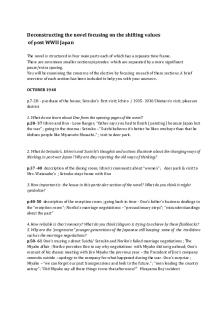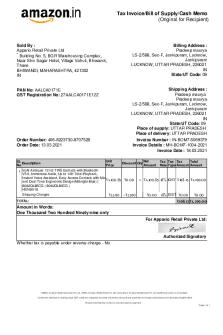Guiding Questions- Chapter 1- Introducing the World of Psychology PDF

| Title | Guiding Questions- Chapter 1- Introducing the World of Psychology |
|---|---|
| Author | hayden hr |
| Course | Introduction to Psychology |
| Institution | Florida International University |
| Pages | 3 |
| File Size | 78.6 KB |
| File Type | |
| Total Downloads | 48 |
| Total Views | 131 |
Summary
Guiding questions to chapter one of "Psychology in Your Life", correlates with week one work of Psychology 2012, intro to psychology....
Description
Guiding Questions- Chapter 1: Introducing the World of Psychology 1. What is psychology? Psychology is the study of mental activity and behavior that is based on brain processes. 2. What us critical thinking? What does it entail? Critical thinking is evaluating information to reach conclusions that are best supported by evidence. Critical thinking entails identifying the statement that you will evaluate, identifying evidence, and determining the most reasonable conclusion about the claim. 3. List and describe the contemporary school of thoughts in psychology, including psychoanalytic theory, behaviorism, Gestalt, humanistic, and cognitive psychology. Structuralism: identifying the basic parts, or structures, of the conscious mind. Functionalism: describes how the conscious mind aids adaption to an environment. Psychoanalytic theory: understand how unconscious thoughts cause psychological disorders. Gestalt: study individuals’ personal perceptions as a unified whole. Behaviorism: describe behavior in response to environmental stimuli. Cognitive: explores internal mental processes that influence behavior. 4. Describe the key focus of the different subfields of psychology, including biological, developmental, social, clinical, and industrial/organizational psychology. Evolutionary: explores how traits are selected to aid adaption in an environment. Biological: study how biological systems give rise to mental activity and behavior. Cognitive: investigates attention, perception, memory, problem solving, and language, based on brain processes. Developmental: researches how people change from infancy through old age. Health: examines how psychological factors affect health and well-being. Personality: analyzes enduring characteristics that display over time and across circumstances. Social: explores how people are affected by others. Cultural: studies how people are influenced by the societal rules that dictate behavior in their cultures. Clinical: considers the factors that cause psychological disorders and the methods to treat them. Educational: investigates effectiveness of techniques in teaching and learning. Industrial/ Organizational: examines issues pertaining to industry and the workplace. 5. Define and recognize examples of the five steps in the cycle of the scientific method. 1. Formulate a theory: a person develops a scientific explanation about a phenomenon. Example: theory that a major cause of car crashes is distracted driving. 2. Develop a testable hypothesis: a person creates a specific, testable hypothesis elated to the theory. Example: using a phone will interfere with driving since it’s distracting. 3. Test with a research method: test hypothesis using a research method, collect your data to evaluate a hypothesis. Example: have participants talk on the phone while in a driving simulator while other participants don’t talk on the phone. 4. Analyze the data: analyze the data and draw conclusions, if the data doesn’t support your hypothesis, you either discard it or revise it and try again.
5. Share the results and conduct more research: submit results to research journals and present them at conferences to share with the scientific community, continue the process by refining your theory, making further predictions and testing hypotheses. 6. Difference between a hypothesis and a theory. A hypothesis is a scientific prediction of what should be observed in a study if a theory is correct while a theory is a model of interconnected ideas/concepts that explains what is observed and makes predictions about future events. 7. Differentiate between the different descriptive methods used in psychology including observational studies, self-reports, and case studies. Descriptive describes what us occurring. Correlational tests the relationship between variables. Experimental investigates what causes the outcome. Observational allows the researcher to watch what participants do in a natural environment or a laboratory. Self-reports use surveys, questionnaires, or interviews to gather information from participants. Case studies allows indepth investigation of one or a few people or an organization. 8. What is the main difference between a correlational study and an experiment? A correlational study examines how variables are related without intervention by the observer while an experiment the variable is under controlled experiments. 9. Describe one example of correlation in your life and explain why this is not a causal relationship. The best example of correlation that is not a causal relationship is the ability to have a goodnights rest and daily stress from school and work. Being unable to prove that lack of sleep is due to stress or if it is caused by something else makes it a causal relationship. 10. What are the two main reasons why correlation methods do not allow us to say one variable cause another? Give examples of directionality problems and 3rd variable problem. The directionality problem and the third variable problem are the two main reasons that correlational methods prevent researchers from being able to state that changes in one variable actually cause changes in another. An example of the third variable problem is people who are risk takers may be more likely to use phones while driving, making risk taking the third variable. An example of the directionality problem is surveying a group of people about their sleeping habits and level of stress, if people report trouble sleeping one cannot determine that stress is causing lack of sleep or if lac k of sleep causes stress. 11. What are the elements of a true experiment? Explain the differences between independent and dependent variables and experimental and control groups. A true experiment must have at least one control group and one experimental group. An independent variable is manipulated during an experiment while a dependent variable measure what the participant does, control groups don’t receive experimental treatment and stays the same.
12. Why should researchers use random assignments? Researchers should use random assignment because it gives all research participants an equal chance of being assigned to the control or experimental groups. 13. How is a sample different from a population? A sample is a specific group you will collect data from while a population is the entire group that you want to draw conclusions about. 14. What is an operational definition and why is it necessary to operationally define variable? Operational definitions qualify (describe) and quantify (measure) variable so they can be understood objectivity. It’s necessary to operationally define variables because it lets other researchers know how you measured your variables and allows them to use identical methods to gather data that will either support or differ from your results. 15. Describe each of the four main ethical issues in research including privacy, confidentiality, informed consent, and protection from harm. 1. Privacy: researchers must respect participants; it is not ethical to observe behavior without consent. 2. Confidentiality: participants information must be kept secret; this prevents other people from linking the study’s findings to the actual participant. 3. Informed consent: people must be told about the research so they can decide if they’re going to participate, if consenting its usually in writing. 4. Protection from harm: researchers cannot ask participants to endure unreasonable pain or discomfort....
Similar Free PDFs

Introducing+the+Randstad+Chapter
- 24 Pages

Introducing the Mahābhārata
- 23 Pages
Popular Institutions
- Tinajero National High School - Annex
- Politeknik Caltex Riau
- Yokohama City University
- SGT University
- University of Al-Qadisiyah
- Divine Word College of Vigan
- Techniek College Rotterdam
- Universidade de Santiago
- Universiti Teknologi MARA Cawangan Johor Kampus Pasir Gudang
- Poltekkes Kemenkes Yogyakarta
- Baguio City National High School
- Colegio san marcos
- preparatoria uno
- Centro de Bachillerato Tecnológico Industrial y de Servicios No. 107
- Dalian Maritime University
- Quang Trung Secondary School
- Colegio Tecnológico en Informática
- Corporación Regional de Educación Superior
- Grupo CEDVA
- Dar Al Uloom University
- Centro de Estudios Preuniversitarios de la Universidad Nacional de Ingeniería
- 上智大学
- Aakash International School, Nuna Majara
- San Felipe Neri Catholic School
- Kang Chiao International School - New Taipei City
- Misamis Occidental National High School
- Institución Educativa Escuela Normal Juan Ladrilleros
- Kolehiyo ng Pantukan
- Batanes State College
- Instituto Continental
- Sekolah Menengah Kejuruan Kesehatan Kaltara (Tarakan)
- Colegio de La Inmaculada Concepcion - Cebu













